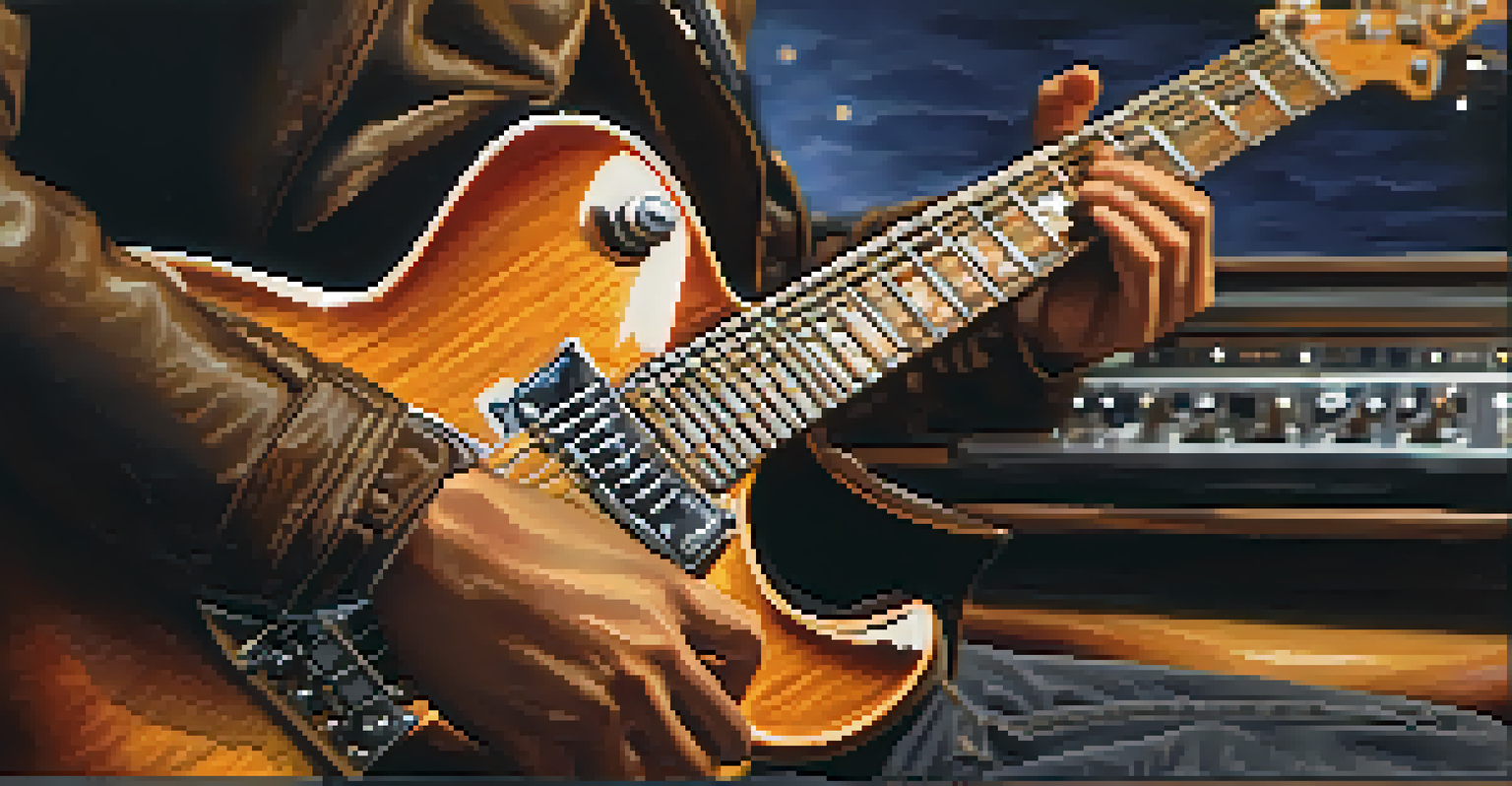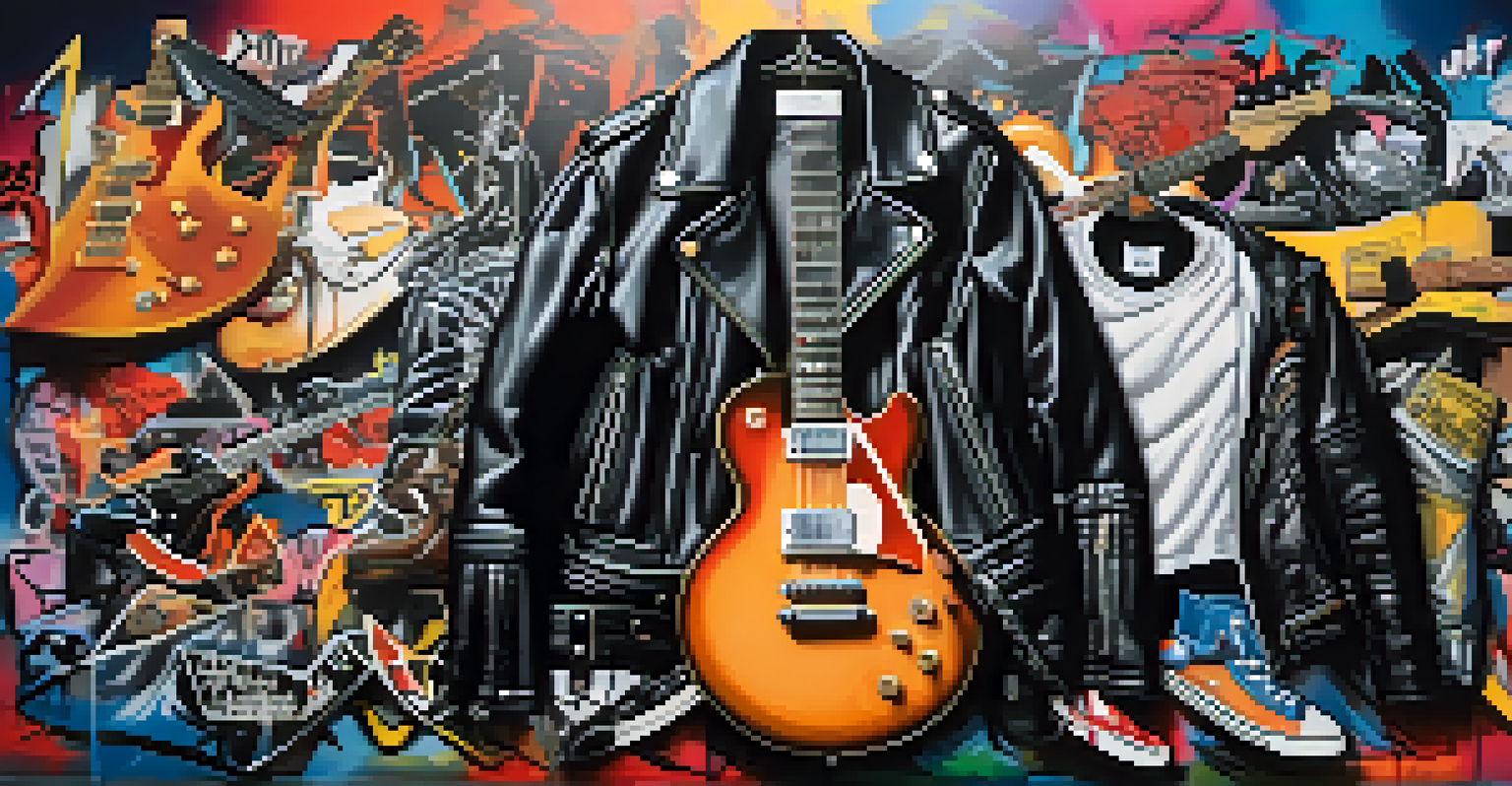The Global Impact of Rock Guitar on Youth Culture

The Roots of Rock Guitar and Its Cultural Significance
Rock guitar emerged in the 1950s, blending blues, jazz, and country, quickly becoming a symbol of rebellion and creativity. This new sound resonated with youth looking for identity and expression during a time of social upheaval. Bands like The Beatles and The Rolling Stones not only revolutionized music but also shaped youth culture, influencing fashion, attitudes, and social movements.
The guitar is a bridge between the past and the present, allowing generations to connect through music.
As rock music gained popularity, it transcended geographical boundaries, bringing together young people from diverse backgrounds. The electric guitar, in particular, became a powerful instrument of self-expression, allowing individuals to convey their emotions and experiences. The raw power of guitar riffs and solos offered an escape and a sense of belonging that many youths craved.
Today, rock guitar remains relevant, serving as a bridge between generations. Young musicians continue to draw inspiration from classic rock legends while infusing their unique styles, ensuring the genre's evolution. This ongoing dialogue between the past and present keeps the spirit of rock alive, influencing contemporary youth culture worldwide.
How Rock Guitar Shapes Youth Identity and Self-Expression
For many young people, playing the guitar is more than just a hobby; it’s a pathway to self-discovery. The act of learning to play can be empowering, fostering confidence and a sense of achievement. As youngsters master chords and strumming patterns, they often find their voice, both musically and personally.

Rock guitar also plays a crucial role in forming social connections among peers. Jam sessions, school bands, and local music scenes create a sense of community that encourages collaboration and friendship. Through shared musical experiences, young people bond over their love of rock, creating lasting memories and networks that can shape their lives.
Rock Guitar as Youth Expression
Rock guitar empowers young people to express their individuality and emotions through music.
Furthermore, rock guitar serves as a tool for tackling important social issues. Many young musicians use their music to address topics like mental health, inequality, and environmental concerns. By channeling their passions into their art, they not only express their individuality but also inspire others to think critically about the world around them.
The Role of Rock Guitar in Shaping Cultural Movements
Throughout history, rock music has been at the forefront of cultural movements, driving social change and challenging the status quo. From the anti-war sentiments of the 1960s to the punk rock rebellion of the 1970s, the guitar has been a powerful voice for youth activism. Rock musicians often use their platforms to raise awareness and incite action, rallying young people around important causes.
Music is the universal language of mankind, and the guitar is its voice.
These cultural movements are not confined to Western countries; they resonate globally. In many parts of the world, rock guitar has become a means for marginalized communities to express their struggles and aspirations. For instance, in countries facing political oppression, rock music often serves as a form of protest, uniting youth in their fight for freedom and justice.
As new genres emerge, the influence of rock guitar continues to inspire diverse musical expressions worldwide. From Latin rock to K-Pop, the essence of rock's rebellious spirit can be found in various forms, illustrating its adaptability and relevance. This universal appeal shows that the guitar remains a vital tool for cultural expression, bridging gaps between different societies.
The Impact of Technology on Rock Guitar and Youth Culture
Advancements in technology have dramatically changed how young musicians engage with rock guitar. With the rise of online tutorials, young players can learn from the comfort of their homes, accessing a wealth of resources at their fingertips. This democratization of music education has made it easier for aspiring guitarists to hone their skills and develop their unique styles.
Social media also plays a vital role in shaping youth culture around rock guitar. Platforms like Instagram and TikTok allow young musicians to showcase their talents and connect with audiences worldwide. This visibility can lead to opportunities for collaboration, performance, and even career advancement, fostering a vibrant online community of rock enthusiasts.
Cultural Movements and Activism
Rock guitar has historically played a vital role in driving cultural movements and youth activism.
However, technology's impact is not solely positive. The pressure to gain followers and likes can sometimes overshadow the love for music itself. Young musicians may find themselves prioritizing trends over creativity, leading to a diluted version of rock's original spirit. Balancing technology with authentic expression remains crucial for the future of youth culture in rock music.
The Evolution of Rock Guitar Genres and Youth Preferences
Rock guitar has branched into various sub-genres over the decades, each attracting different youth demographics. From classic rock and grunge to metal and indie, there’s a flavor of rock for everyone. This diversification allows young people to find a genre that resonates with their personal experiences and emotions.
As new genres emerge, they often reflect the changing values and issues faced by youth today. For instance, the rise of emo and pop-punk in the early 2000s addressed themes of mental health and heartbreak, striking a chord with many young listeners. In contrast, contemporary bands may explore themes of social justice and identity, showcasing the genre's adaptability to societal shifts.
Moreover, the blending of rock with other genres, like hip-hop and electronic music, has introduced fresh sounds that appeal to today's youth. This fusion creates exciting new pathways for musical exploration, allowing young musicians to experiment and innovate. Ultimately, the evolution of rock guitar genres continues to shape youth culture, reflecting their unique voices and perspectives.
Rock Guitar’s Influence on Fashion and Lifestyle Choices
Rock guitar has profoundly influenced youth fashion trends, often symbolizing rebellion and individuality. From leather jackets and band tees to vibrant hairstyles, the aesthetic associated with rock music allows young people to express their identities. This connection between music and fashion empowers youth to break societal norms and embrace their uniqueness.
Moreover, the lifestyle choices of rock musicians often serve as a template for youth aspirations. Young fans admire the adventurous, free-spirited lifestyles of their favorite guitarists, often emulating them in their own lives. This influence can manifest in various ways, from adopting a rock-and-roll attitude to seeking out experiences that embody freedom and creativity.
Technological Impact on Music
Advancements in technology have transformed how young musicians learn and share their rock guitar experiences.
However, it’s essential to recognize that this influence is a double-edged sword. While rock culture encourages self-expression, it can also promote unhealthy behaviors associated with the rock lifestyle. Striking a balance between celebrating individuality and making responsible choices is crucial for youth navigating these influences.
The Future of Rock Guitar and Its Impact on Youth Culture
As we look to the future, rock guitar will undoubtedly continue to evolve and influence youth culture in unexpected ways. With emerging technologies and changing musical landscapes, young musicians will find new avenues to express their creativity. The fusion of genres and styles will keep rock guitar relevant, ensuring it remains a vital part of the musical dialogue.
Moreover, the global nature of music consumption means that rock guitar will continue to connect youth across cultures. As young musicians share their stories and experiences through this powerful instrument, they will foster understanding and unity among diverse communities. Rock guitar can serve as a universal language, transcending borders and bringing people together.

Ultimately, the enduring legacy of rock guitar lies in its ability to inspire and empower youth. As long as young people seek connection and self-expression, rock guitar will remain a significant force in shaping their culture and identity. Embracing this rich history while innovating for the future will ensure that rock guitar continues to resonate with generations to come.